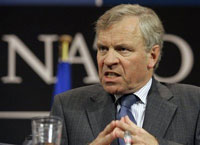Russia laughs at NATO’s face
Dmitry Rogozin, Russia’s ambassador to NATO, believes that Georgia will not be able to join the Membership Action Plan in December. The official added that the recent statements from NATO Secretary General Jaap de Hoop Scheffer marked the beginning of a cold war between the alliance and the European Union.

A NATO delegation with Jaap de Hoop Scheffer at the head arrived in Georgia with a two-day visit on Monday. The delegation consisted of officials representing all 26 countries of the alliance. The session of the NATO-Georgia committee became the key event of the visit. Scheffer arrived in Georgia to find out if Georgia was successfully meeting the requirements to obtain the status of a NATO membership candidate.
Russia’s Foreign Minister Sergei Lavrov visited South Ossetia yesterday too, which, as Brussels believes, was not a mere coincidence.
The visit of the official delegation of NATO to Tbilisi is taking place on the threshold of the informal meeting of defense ministers of the alliance, which is slated to take place in London on September 18-19. The situation in the Caucasus will become one of the central issues on the agenda of the meeting. Scheffer was discussing the question with the Georgian administration too (including President Saakashvili), as well as with spokespeople for the opposition and international organizations.
A diplomatic source at NATO headquarters said that the current events in Tbilisi implied a political support to Georgia.
Jaap de Hoop Scheffer stated recently that it was impossible to accept the agreements between the Russian Federation and the European Union on the assumption of the fact that the Medvedev-Sarkozy plan involves too many concessions for Russia.
Dmitry Rogozin said that such remarks question the peacemaking mission of the European Union.
Scheffer said in a recent interview with The Financial Times that the pull-out agreement signed by Sarkozy and Medvedev on September 8 was unacceptable, since the document stipulated too many concessions for Moscow. Scheffer disagreed with the fact that Russia was allowed to preserve its military presence in the two regions.
Such statements from NATO’s Secretary General go against a softer stance of the European Union. The EU prefers not to focus attention on the presence of Russian troops in Abkhazia and South Ossetia.
“A cold war broke out in Brussels between the two bureaucracies of the EU and NATO. They can collide in Georgia because they have a different vision of the situation in spite of the fact that the two organizations consist of one and the same countries,” the Russian official said. “Scheffer’s statements also prove that the EU has succumbed to Russia’s pressure,” Rogozin added.
Dmitry Rogozin described the talks within the framework of the Euro-Atlantic Council in Brussels (26 NATO countries plus 24 partners, including Russia and CIS countries) as very hard and heated. The beginning and the end of every speech from each official at the meeting was identical, Rogozin said.
Russia did not win the support of its stance from any participant of the meeting. Dmitry Rogozin said that both Russian and Georgian ambassadors set out their estimations of what happened in the Caucasus , although no one agreed upon the Russian version. Unlike Georgia, Russia did not give its endorsement for the international investigation of the events in South Ossetia.
“When I was talking about the role, which NATO, particularly the USA, played during the conflict in the Caucasus, the US ambassador stormed out of the room,” the Russian ambassador to NATO said.
Speaking about the initiative of the international investigation, Rogozin said: “When NATO refuses to answer the question of who attacked whom, although the answer is obvious, there is no need to speak about this investigation as independent. Who is going to be an independent investigator? Condoleezza Rice?”
“Russia will consider the suggestion about the investigation only if Abkhazia and South Ossetia are invited in Brussels and New York. The side that suffered from Saakashvili’s aggression must have an opportunity to express its point of view,” Rogozin said.
Subscribe to Pravda.Ru Telegram channel, Facebook, RSS!





